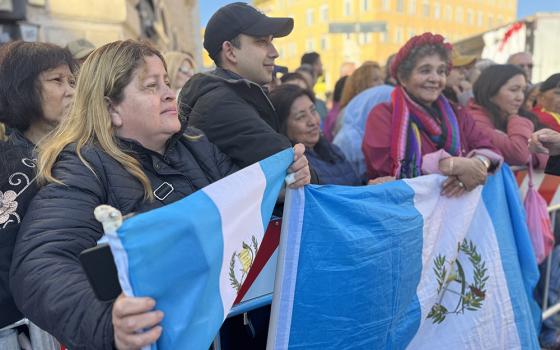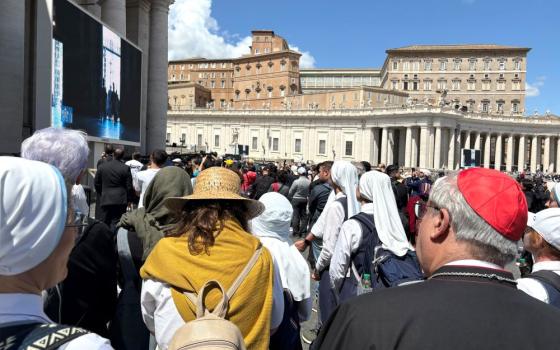Salesian Father John Crossin. (CNS photo/Nancy Wiechec)
Fr. John W. Crossin, an Oblate of St. Francis de Sales, who was an expert in the field of Christian ecumenism and interreligious dialogue, died May 12 after a brief illness. He was 75.
A professed member of the Oblate community for 56 years and a priest for 47 years, he was a teacher, theologian, author and scholar. In addition to ecumenism and interreligious dialogue, his scholarship also focused on ethics, virtue and friendship.
From late 2011 through 2016, Crossin was executive director of the Secretariat for Ecumenical and Interreligious Affairs at the U.S. Conference of Catholic Bishops in Washington.
In 2014, he was one of a number of consultants Pope Francis named to what is now called the Dicastery for Promoting Christian Unity. In that capacity, Crossin was a member of the dicastery's team for the Joint Working Group with the World Council of Churches.
A wake for the priest will be held May 17 from 1 p.m. to 3 p.m. (local time) at St. John Neumann Parish Community in Reston, Virginia, followed by a funeral Mass at 3 p.m. Another viewing will be held the morning of May 18 at the Oblate Retirement Residence in Childs, Maryland, followed by burial in the Oblate Cemetery.
"With sadness, but with faith in the Resurrection," Crossin's religious order announced his passing.
"(He) lived a life dedicated to living the Gospel in the spirit of St. Francis de Sales, the gentleman saint. He brought the lessons and inspiration of Francis into his academic and pastoral work," said in a statement posted on the website of his religious order, which has its North American headquarters in Wilmington. "He was passionate about exploring the breadth of the Christian faith and finding common ground with all faiths."
Reflecting on his most recent book, "Moving into the Ecumenical Future: Foundations of a Paradigm for Christian Ethics," published in November 2022, Crossin "was most optimistic that it may be the foundation for an international dialogue about ecumenical studies," the statement said. "He reflected, 'I hope this book will help bring us together, which is Jesus' will at the Last Supper; pray that we be one.'"
"An educator throughout his life, in his final weeks, Father John taught us how to live in the present moment," it said. "May he experience the fullness of God's presence, which he saw revealed in Scripture, the Church and Salesian Spirituality. May he rest in peace."
In a brief statement published on the USCCB website May 12, the Secretariat for Ecumenical and Interreligious Affairs said it received the news of Crossin's death "with great sadness," adding that "he is remembered fondly for his tenure" at the secretariat. "Please join us as we remember his contributions to ecumenism and interreligious understanding. May he rest in our Lord's embrace," it added.
When he took the USCCB post in late 2011, Crossin had led the Washington Theological Consortium since 1999. He was a visiting fellow at the Woodstock Theological Center, 1997-98; president of De Sales School of Theology in Washington, 1987-97; and academic dean at De Sales, 1986-87. He served on weekends for 20 years at Annunciation Parish in Washington, where he was parochial vicar.
He also had served his religious order as a superior, member of the provincial council and assistant general treasurer.
Advertisement
Crossin held a doctorate in moral theology and master's degrees in psychology and theology from The Catholic University of America in Washington. He was past president of the North American Academy of Ecumenists and the Thomas More Society of Washington.
Widely published in theological journals and the author of five books, he also taught at Catholic University, Wesley Theological Seminary, Virginia Theological Seminary, Gettysburg Lutheran Theological Seminary and De Sales.
John William Crossin was born May 17, 1947, in Philadelphia, the oldest of four children of John William and Marie (Astley) Crossin. He attended Father Judge High School in Philadelphia and joined the Oblates of St. Francis de Sales after graduation in 1965. John had been a scholar and athlete at Judge and declined several scholarships, including to the University of Pennsylvania, to enter religious life.
He made his first profession of vows in 1967 and his perpetual profession of vows in 1971. For his apostolic internship, he taught math at Northeast Catholic High School in Philadelphia.
He earned a bachelor of science degree in mathematics (summa cum laude) at Allentown College of St. Francis de Sales (now DeSales University), then earned his master's degrees at Catholic University.
He was ordained a priest May 15, 1976, at Our Lady of Ransom Church in Philadelphia. Crossin taught religion at Salesianum School in Wilmington for a year. In 1982, he received his doctorate in moral theology from The Catholic University of America.
During his tenure at the USCCB, a landmark 120-page document marking the progress in Catholic-Lutheran relations over the past 50 years and mapping the remaining steps needed to achieve full unity was affirmed in October 2015 by the Evangelical Lutheran Church in America's Conference of Bishops.
The "Declaration on the Way" was prepared by a joint task force of the U.S. Conference of Catholic Bishops' Committee on Ecumenical and Interreligious Affairs and the Chicago-based ELCA.
The document's introduction said the two churches have come a long way since "the disunity, suspicions and even hostilities that characterized our relationships for generations," but said the time had come "to claim the unity achieved through these agreements, to establish church practices that reflect this growth into communion and to commit ourselves anew to taking the next steps forward."
After he left the USCCB post, Crossin became director of spiritual formation at the St. Luke Institute in the Washington suburb of Silver Spring, Maryland, followed by a research sabbatical during which he wrote his last book, "Moving into the Ecumenical Future."
His other books were "What Are They Saying About Virtue" (1985); "Walking in Virtue: Moral Decisions and Spiritual Growth in Daily Life" (1998); "Everyday Virtues" (2002); and "Friendship: The Key to Spiritual Growth" (2014).





